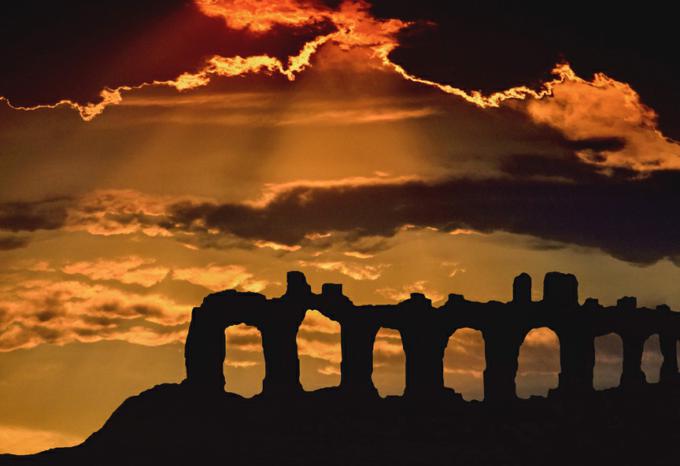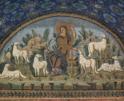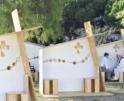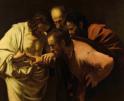
Faith
Without the layers of lived faith beneath us, we have nothing to stand on and no foundation that can support anything we hope to build.

Wolfe
One thing I love about traveling outside the U.S. is how the timeline stretches. On the other side of the Atlantic, history quadruples, and our very oldest things suddenly seem quite young. It's not that American history doesn't stretch back further than what European immigrants and colonists have recorded. It most certainly does. But the past five centuries seem just a bit less significant when the road you drive on was constructed 23 centuries ago, or the church where you attend Mass was rebuilt after an earthquake, fire, or flood in the 14th century. And that's only what we see.
So much of history is underground. Civilization is not just thousands of years old, it's many layers deep. More often than not, we build on top of what came before us. Our ancestors have recycled the ruins and reused the stones. They've robbed ancient graves, moved human remains, and built churches over the resting places of the saints. They've turned pagan temples into churches, extended ancient foundations, and filled in the earth around them. They've rebuilt what was destroyed by war or natural disaster and remodeled older simpler things to update them and make them grander. People almost always build something new where something older once stood. That's why archaeological discoveries are still made when new construction is begun.
This is also what the Church does. We build on the faith handed onto us by the Apostles as it has been received through history. Scripture, liturgy, the lives of the saints and their wisdom, popes, councils, religious orders, missionary endeavors, controversies resolved and not, art and architecture, music, literature, science, ecclesial movements of all kinds: we are who we are and where we are because of all that came before us.
And so, we rarely build on virgin ground; there is always history to stand on and contend with. But that also means that we never have to reinvent the wheel. The foundations might need to be filled in or dug out, repaired or redesigned, but they are already there. We may need to excavate to discover it, but something beautiful or functional once existed right where we are. And there is something to be gained from learning everything we can about it.
History should never hold us back. But if we disregard what came before us as primitive or unsophisticated, we both imperil and impoverish ourselves. Without the layers of lived faith beneath us, we have nothing to stand on and no foundation that can support anything we hope to build. But we also lose the kind of beauty that elevates the human soul. Functionality matters, but it is not sufficient. The Church, after all, is a body, a bride, and not a machine. Beautiful old columns we can no longer afford to create can be reused. Ancient ways of conveying the faith can be carefully restored, the same way frescoes painted 800 years ago can be. And yet, the Church is the living household of God and not a museum. Our incarnational faith cannot be accompanied by velvet ropes that prevent us from entering in or signs that tell us "Do Not Touch."
I know how tempting it is to think that everything new is necessarily improved, or that everything old is necessarily superior. The funny thing is that, at some point, the things we think of as antiquated and outdated or venerable and timeless were also new. Flying buttresses, blue stained glass, and one-point perspective were all innovations. Massive domes and tall bell towers were technological advancements just as electric lights and microphones are.
As human beings, we bear the image of God. Thus, our place in creation isn't merely one of practical functionality. We are called to be like God in every way: in truth, in goodness, and in beauty. Fulfilling the calling built into our very existence becomes more difficult when the world around us denies the possibility of truth, promotes self-interest and absolute autonomy as the good, and substitutes practicality and expediency for beauty. But all those things are why it is so important for us to embrace the foundations of faith laid by those who came before us and move forward by building up rather than tearing down. Only then will we see the Christian renaissance we all hope for.
- Jaymie Stuart Wolfe is a Catholic convert, wife, and mother of eight. Inspired by the spirituality of St. Francis de Sales, she is an author, speaker, and musician, and provides freelance editorial services to numerous publishers and authors as the principal of One More Basket. Find Jaymie on Facebook or follow her on Twitter @YouFeedThem.
Recent articles in the Faith & Family section
-
Scripture Reflection for April 21, 2024, Fourth Sunday of EasterJem Sullivan
-
The new Temple: How Easter changes religionDr. R. Jared Staudt
-
The wonder of Ordinary TimeLucia A. Silecchia
-
Is there still responsibility for past sins after confession?Jenna Marie Cooper
-
Wounds, not scarsJaymie Stuart Wolfe


















